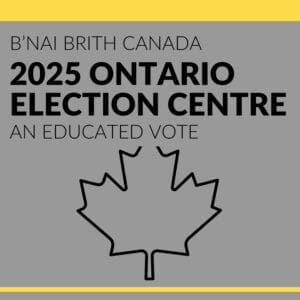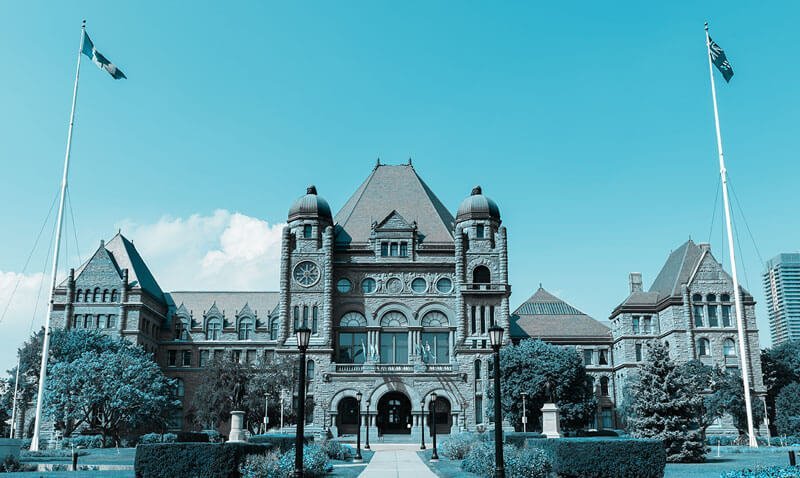Where the Parties Stand on issues important to the jewish community
Where the Parties Stand on issues important to the jewish community
On February 27, Ontario voters will elect their next Provincial Government. Jews make up 1.2% of the province’s population, with half of Canada’s Jewish community calling Ontario home. Jewish Ontarians have a proud history of contributing Ontario’s growth and success and are an integral part of communities across the Province.
As the voice of Canada’s grassroots Jewish community and to help Jewish voters make an informed decision, B’nai Brith Canada is surveying the main political parties vying to form the next government about their positions on issues that matter to the community.
Protecting Vulnerable Infrastructure
Question 1: If elected, what measures will your government propose to protect the sanctity of vulnerable infrastructure, including places of worship and other religious and cultural institutions?
Context:
B’nai Brith Canada has repeatedly heard from members of communities across Ontario who are scared to exercise their rights and unable to enjoy their Charter freedoms. They are afraid to attend to synagogue or other institutions affiliated with the Jewish faith for fear that they will be targeted for their attendance.
No Canadian should have to choose between exercising their fundamental freedoms and ensuring their safety and well-being. Every Canadian, including the residents of Ontario, deserves to be assured that their faith-based and cultural institutions will be protected from those who wish to nefariously target such institutions and their users.
The increasing frequency of the occurrence of nuisance protests and other problematic events across the province has caused municipalities to examine the feasibility of and to enact bylaws to protect vulnerable infrastructure from the negative ramifications of such demonstrations and events. The cities of Brampton and Vaughan have passed by-laws restricting the occurrence of nuisance protests within a reasonable distance of places of worship and vulnerable infrastructure respectively. The Town of Oakville and the City of Toronto have authorized studies to explore the same in their municipalities.
There is currently no provincial legislation in place to protect vulnerable infrastructure, leaving Ontario’s religious and cultural communities vulnerable.
Ontario Liberal Party
Every Ontarian deserves to feel safe in their places of worship and cultural spaces, and it is our obligation to make their protection a priority.
To help safeguard these spaces, Ontario’s Liberals will:
- Introduce the SAFE Rebate (Supporting Access to Funding for Equipment). This program will offer rebates of up to $500 for homes, $5,000 for small businesses, and $10,000 for religious and cultural institutions to purchase security equipment that deters auto theft, robberies, and other criminal activities, including hate-motivated crimes/activities. By enhancing security infrastructure, we can better protect communities and assist law enforcement in monitoring and catching criminals.
- Ban organizing or participating in hate-motivated activities or protests that incite violence or intimidation within 100 metres of the property line of any vulnerable social infrastructure (ex. place of worship, school, childcare centre, or hospital) anywhere in the province, and impose a maximum fine of $100,000 for each violation.
- Establish the SHIELD Fund (Support for Hardware and Infrastructure Enhancement for Law-enforcement Departments) for municipal police services to procure and maintain technology and modern equipment that facilitates crime prevention, intelligence gathering, data and information sharing among local law enforcement agencies, and expeditious investigation.
PC Party of Ontario
Antisemitism has no place in Ontario, and that includes targeting our Jewish places of worship. As the troubling rise of antisemitism spreads globally, we stand unwavering with Ontario’s Jewish community, and we are committed to ensuring their safety, dignity, and freedom to live without fear. Since 2021, we have allocated over $86 million to help protect faith-based and cultural organizations against hate-motivated violence, including synagogues and Jewish community centres. We know that eradicating hate requires a collective, sustained effort. That’s why we will continue working side by side with Jewish organizations to address the specific needs of the Jewish community to tackle antisemitism head-on and ensure they can thrive in Ontario without fear of harassment or violence.
Rallies that Promote Hate
Question 2: If elected, how will your government work with the federal government, municipal leaders, and law enforcement to combat the divisive and inciting protests and rallies that have been compromising the well-being of Ontarians and threatening the vitality of communities across the Province?
Context:
Since the October 7 Hamas-led terrorist attack on Israel, there has been a significant increase in the number of protests and rallies taking place across Ontario. While many of these have been peaceful events, a concerning number have devolved into problematic occurrences involving intimidation, incitement, hatred, the glorification of violence, and support for terror.
As noted in B’nai Brith Canada’s Seven Point Plan to Tackle Antisemitism, “Law enforcement agencies must actively monitor and intervene at events where hate speech and incitement to violence are likely, ensuring that participants and organizers face legal consequences.”
B’nai Brith Canada has consistently warned that the failure to enforce the rule of law in response to antisemitic incitement at hate-driven rallies will inevitably lead to the further fomentation of hatred and division across Ontario.
Ontario Liberal Party
Ontario must remain a place of respect, inclusivity, and safety for all.
Peaceful expression is a Charter-protected right, but when protests cross the line into hate-motivated activities, violence, or intimidation, we must act to protect public safety, the sanctity of our community spaces, and uphold our shared values.
To achieve this, Ontario’s Liberals will:
- Ban organizing or participating in hate-motivated activities or protests that incite violence or intimidation within 100 metres of the property line of any vulnerable social infrastructure (ex. place of worship, school, childcare centre, or hospital) anywhere in the province, and impose a maximum fine of $100,000 for each violation; ensuring clear consequences for those who seek to spread hatred in our society or create division or violence amongst us.
- Make it a provincial offence punishable by fines or imprisonment in a provincial jail for defacing statues, public buildings, or cultural/religious institutions.
We will work closely with the federal government, municipal leaders, and law enforcement agencies to ensure consistent enforcement of these measures and to take further actions to safeguard public spaces. This includes raising awareness, delivering educational resources, and advancing cooperation and coordination among local law enforcement agencies.
PC Party of Ontario
If re-elected, our government will continue to make the safety and well-being of Ontarians our top priority, including protecting the Jewish community from hate-fueled protests and rallies. We understand that protests and rallies are a vital part of democratic expression, but when these gatherings cross the line into promoting violence, antisemitism, or endangering public safety, we will not stand by. We will ensure that local law enforcement has the full support, resources, and authority needed to prevent and respond to any threat or disruption effectively. We will maintain strong communication between all levels of government to guarantee a unified and coordinated response when any threat arises. This will ensure that, together, we safeguard not just the right to protest, but also the right for all Ontarians, including Jewish Ontarians, to live free from fear and violence.
Antisemitism in Ontario Schools and on Ontario Campuses
Question 3: If elected, what steps will your government take to ensure that Ontario’s high schools and post-secondary campuses are safe spaces for Jewish students?
Context:
Jewish students in Ontario’s high schools and post-secondary institutions do not feel safe.
Since the October 7 Hamas led terrorist attack against Israel, there has been a slew of walkouts, demonstrations, riots, encampments, and other incidents that have incited antisemitism and threatened the well-being of Jewish students in Ontario’s high schools and post-secondary institutions.
During discussions with Jewish students across Canada, B’nai Brith Canada has identified that there is an apparent lack of understanding amongst members of our secondary and post-secondary school communities surrounding what constitutes contemporary antisemitism.
There is an apparent need to increase secondary and post-secondary students’ awareness of the Government of Ontario’s definition of antisemitism, the International Holocaust Remembrance Alliance (IHRA) definition.
In advance of the current school year, in response to concerns from Jewish students and their families, B’nai Brith Canada launched two policies, earmarked respectively for implementation by school boards and post-secondary institutions:
- B’nai Brith Canada’s Policy for Combating Antisemitism in Schools (PCAS) – Introduced on September 26, 2024, its purpose is to “enhance the protection and inclusion of Jewish students within the school board’s existing Anti-Racism and Anti-Hate frameworks. Its purpose is to ensure that the school environment is free from antisemitism and to provide Jewish students with support in expressing their cultural, religious, and historical identity. The policy aligns with the school board’s commitment to creating a welcoming and safe learning environment for all students, and fostering an equitable, inclusive, and diverse community.”
- B’nai Brith Canada’s Policy for Combatting Antisemitism on Campuses (PCAC) – Introduced on September 13, 2024, its purpose is to “enhance the protection and inclusion of Jewish students within the institution’s equity, diversity, and inclusion (EDI) frameworks. Its purpose is to ensure that the campus environment is free from antisemitism and supports Jewish students in expressing their cultural, religious, and historical identity. The policy aligns with the institution’s commitment to fostering an equitable, inclusive, and diverse community for all students.”
Ontario Liberal Party
We must protect the sanctity of our learning environments. No student should feel threatened or unsafe while pursuing their education, and we will work with all partners to uphold this fundamental right.
An Ontario Liberal government will take decisive action to ensure that Ontario’s elementary, middle, and secondary schools as well as post-secondary campuses are safe spaces for Jewish students.
We will work closely with school boards and post-secondary institutions to develop and enforce policies that ensure a safe learning environment for all students. This includes strengthening campus security measures, investing in tools and equipment such as CCTV cameras that enhance safety, increasing awareness among instructors, staff, parents, and students; and ensuring that institutions take swift action against hate-motivated incidents.
Additionally, we will require that all school boards and post-secondary institutions submit regular reports detailing security risks, incidents, and the steps they are taking to address them. These reports will help guide further government action and ensure accountability in keeping students safe.
Through these measures, our government will stand firmly against antisemitism and all forms of hate, ensuring that Ontario’s learning institutions remain places of inclusion, respect, and safety for every student.
PC Party of Ontario
We will continue to ensure that Ontario’s high schools and post-secondary campuses are not just safe but empowering spaces for all students. Recently we passed Bill 166, the Strengthening Accountability and Student Supports Act, which required colleges and universities in Ontario to put into place clear policies to address antisemitism. We were also the first government in Canada to introduce mandatory Holocaust education in elementary and secondary schools. Additionally, we invested in community partnerships with Jewish organizations like Friends of Simon Wiesenthal Center and the Centre for Israel and Jewish Affairs to provide resources and programming for students and educators on Holocaust education and training on how to identify and take action to address antisemitism. We will always fight to protect Jewish students—and all students—from hate, intimidation, and discrimination.
Implementing the International Holocaust Remembrance Alliance (IHRA) Definition of Antisemitism
Question 4: If elected, how will your government implement Ontario’s IHRA definition of antisemitism?
Context:
In October 2020, the Provincial Government adopted the IHRA working definition of antisemitism (IHRA Definition). The next government has the unique opportunity to take the next step by implementing and applying the IHRA Definition.
With this goal in mind, B’nai Brith Canada has provided parties with B’nai Brith Canada’s Roadmap to the Implementation and Application of the IHRA Working Definition of Antisemitism. This roadmap demonstrates how the definition can serve as a practical tool for identifying and addressing antisemitic incidents.
For example, it can be used in law enforcement training, education, and other areas to better identify and investigate antisemitic occurrences.
Application of the definition can also occur through:
- Policies and directives
- Legislation and Orders in Council
- Action plans
- Training programs for civil servants and political staff
- Guidance manuals for law enforcement, prosecutors, the judiciary, school boards, universities, and medical professionals
- Documentation in provincial government materials
Ontario Liberal Party
“Antisemitism is a certain perception of Jews, which may be expressed as hatred toward Jews. Rhetorical and physical manifestations of antisemitism are directed toward Jewish or non-Jewish individuals and/or their property, toward Jewish community institutions and religious facilities.”
An Ontario Liberal government will take concrete steps to ensure the full implementation of Ontario’s adoption of the International Holocaust Remembrance Alliance (IHRA) definition of antisemitism. This definition is a critical tool not just in identifying but combating antisemitism in all its forms. While adopting this definition is important, there remains much work to do to turn this into meaningful, concrete policy. Only by fully
implementing the IHRA definition, can our government ensure that antisemitism is recognized and effectively addressed in all areas of public life in Ontario. In consultation with community organzations and leaders, Ontario’s Liberals:
Legislative and Policy Integration
- Formally incorporate the IHRA definition into provincial policies, ensuring it is used as a guiding framework in government decision-making, law enforcement, and education.
- Ensure all provincial agencies, school boards, and publicly funded institutions adopt and apply the definition in their policies and procedures.
Training and Education
- Mandate training for law enforcement, educators, and public servants to recognize and address discriminatory and antisemitic incidents effectively.
- Develop campaigns to raise awareness of contemporary antisemitism and the importance of combating hate in all forms.
Strengthening Enforcement and Accountability
- Require law enforcement and public institutions to track and report antisemitic incidents using the IHRA definition as a standard for classification.
- Work with the Human Rights Tribunal of Ontario to ensure that cases of antisemitism are properly addressed.
Campus and Workplace Protections
- Work with post-secondary institutions and workplaces to implement clear policies that combat antisemitism and protect Jewish students and employees.
- Ensure that universities and colleges enforce their policies to effectively combat antisemitic discrimination or harassment.
Community Support and Security
- Introduce the SAFE Rebate, ban organizing or participating in hate-motivated activities or protests that incite violence or intimidation within 100 metres of the property line of any vulnerable social infrastructure (ex. place of worship, school, childcare centre, or hospital) anywhere in the province, and establish the SHIELD Fund (Support for Hardware and Infrastructure Enhancement for Law-enforcement Departments) for municipal police services to procure and maintain technology and modern equipment that facilitates crime prevention.
- Increase funding for initiatives that create awareness and facilitate hate crime prevention, and strengthen partnerships with community organizations to combat antisemitism.
PC Party of Ontario
Our government took swift and decisive action in becoming the first province in Canada to adopt the IHRA definition of antisemitism. We recognize the importance of having a clear and comprehensive definition to guide our efforts in combating antisemitism and ensuring that hate is not tolerated in any form. We will continue to ensure that there are clear protocols for reporting antisemitic incidents, and that they are taken seriously and investigated thoroughly. We want Jewish communities to feel supported and safe, knowing that the Ontario government is actively working to fight antisemitism.









